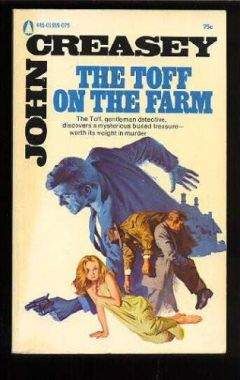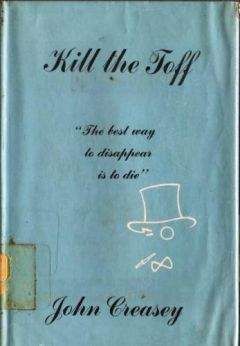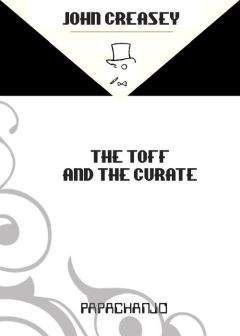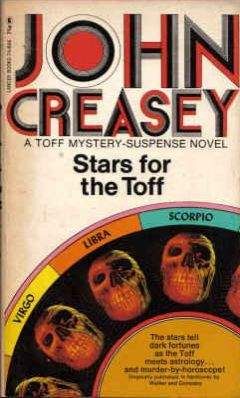John Creasey - The Toff and The Lady
“I see. Well, plenty was doing at Barrington House. I got off lightly. Are you in a receptive mood?”
“I think so, sir.”
“Good! Then listen to me. Take Farrow the footman first,” said Rollison. “I have always thought him insolent, but I am not sure whether that’s the right word. He’s not a footman, and can’t hide it. He might be employed by Pomeroy. But on the other hand, someone sent me that photograph and so was sure of impending trouble; the same person might have employed Farrow to work and watch at the house.”
“You mean, perhaps, Mr. Barrington-Ley?” murmured Jolly.
“Yes.”
“Which would be a presumption of Mr. Barrington-Ley’s complete innocence.”
“I know,” said Rollison, “that’s what I want to presume. We’ll have to check on Farrow. Now, what of Dr. Renfrew?”
“I have made some further inquiries about him,” said Jolly. “He is in some financial difficulties. I do not know in what degree, but I hope to find out shortly.”
“If he’s desperately hard up, he might do odd things for money,” said Rollison. “Check that as soon as you can. And now . . .”
During the next quarter of an hour Rollison regaled Jolly with the salient points of the story, while he undressed, put on pyjamas and a dressing-gown and got into bed gratefully. Jolly arranged the pillows so that he had support for his neck without pressure on the tender spot of his cranium. Then he stood by the side of the bed.
“And so,” said Rollison, at last, “that’s the whole story. What do you make of it?”
“I am rather at a loss, sir, to understand your uncertainty about the footman,” said Jolly. “He certainly had every opportunity to inject the drug on two occasions—I assume that the second occasion was like the first, an injection of adrenalin?”
“It had the same effects, and Cray thinks so.”
“Then it is reasonably certain that it was administered by the same person, sir.”
“Yes. Adrenalin isn’t the easiest of drugs to obtain, you know.”
“No, sir, but unqualified persons have access to even more dangerous drugs than that—as you have often discovered.”
“The narcotics, yes. Adrenalin is a different matter. Why did Renfrew compromise his whole future by saying nothing about what he admits was an attempt at murder?”
“His explanation appears sufficient, sir,” said Jolly thoughtfully.
“Appears, yes. And it also would be a very good explanation if he actually gave the injection.” Rollison smiled at Jolly’s expression. “Suggestion not well received, Jolly?”
“Well, sir, with the utmost respect—would the man who first interested you in this matter and who arranged to send Madam here, take such a step?” asked Jolly.
“Meaning that the bump on my head is affecting my logic,” said Rollison. “Many things which Renfrew has done seem unlikely. Why did he get a friend to take her to his home—I mean our guest—and then send her here in a taxi? And why did he keep her away from here for several hours?”
“Is it so remarkable, sir?”
“At the moment, I think so,” said Rollison. “Renfrew was in a great hurry to get away after talking to me, but he returned remarkably quickly. The last thing I saw when I was hanging from the window was Renfrew coming into the room. Then someone stabbed me in the hand, with the unkind intention of making me break my neck.” When Jolly did not answer, Rollison went on: “The doubts about the villainy of Farrow the footman come in there. He wasn’t in that room. He had, apparently, fled the house before then. Renfrew was there with Miss Gwendoline, the butler, another footman, and the maid. Any one of them could have come to the window and used the knife, but it could not have been the footman.”
“I can follow you now, sir,” said Jolly obligingly. “But Dr. Renfrew”
“Is practically engaged to Miss Gwendoline,” said Rollison. “I would like to know a lot more about him. Background— real financial position, social reputation—all that kind of thing. Also, whether he possesses a Leica camera of the kind that can take excellent photographs through a waistcoat button-hole.”
“You mean that you doubt whether he did send the photograph?” said Jolly.
“I mean that I want to make sure,” said Rollison. “I put that statement into his mouth, and he accepted it after a noticeable pause. It might have been the result of being found out and being reluctant to admit it, but at this stage why should he be reluctant? What is more,” went on Rollison, warming up, “it might have been hesitation consequent upon getting an unexpected piece of information—hesitation while he made up his mind whether to turn it to his advantage or not. If Renfrew’s mixed up in this he would be smart enough. If he didn’t send me that photograph, he seized a unique opportunity to whitewash himself by agreeing that he did.”
“I suppose that is so, sir,” said Jolly, without enthusiasm.
“You still don’t like it?” said Rollison.
Jolly spent a few moments in profound reflection, and then said thoughtfully:
“I must admit that I see several difficulties, sir. For instance, would Miss Gwendoline be so easily deceived? You imply, sir, that Renfrew and Mr. Barrington-Ley were working in concert”
“Not Mr. Barrington-Ley.”
“Then I don’t quite understand you, sir.”
“It seems to me,” said Rollison, dreamily, “that someone is most anxious that we should believe that David Barrington-Ley is a scoundrel. So much points to him. The police will. I’ve no doubt, soon be working on that assumption, but—I know him fairly well. Jolly.”
“If you will forgive me for saying so, sir, you really allow personal liking to affect your judgment.”
“Not liking only, Jolly—my knowledge of the man. Two things are possible. One, that he had been blackmailed by Pomeroy, Shayle, and the others, and forced to behave in this uncharacteristic manner. Two, that he is doing it willingly. His wife and daughter lean towards the second, presumably. I lean towards the first. If we assume that I’m wrong, we must also assume that Barrington-Ley has been a party to all that has happened. Many things, some apparently contradictory, have happened, Jolly. First—and I think the incident which brought it all out into die open and was not, therefore, premeditated—the arrival of the strange visitor to the Bal Masque. Afterwards, there came what appeared to be an attempt to murder her, but because of what we have heard of Marcus Shayle’s instructions to Phyllis Armitage, that might have been simply an attempt to frighten her and encourage her to talk more freely. A nurse is a likely confidante, isn’t she?”
“Yes, sir, I think that is reasonable.”
“There followed what I think was an attempt on Phyllis Armitage’s life, which I was able to stop before it got really under way. Then a series of minor incidents followed with the sudden rush of events in the last few days. Barrington-Ley’s disappearance—the attempt to murder Miss Gwendoline, die two attempts on Mrs. Barrington-Ley’s life and, let’s face it, the attempt to-day on mine. Would a man attempt to murder his own daughter—or give instructions for such an attempt to be carried out, and would he kill his own wife?”
After a pause, Jolly said:
“According to the letter which Miss Gwendoline gave you, sir, there is a motive for his wishing his wife dead.”
“Ah, yes,” said Rollison. “But why his daughter?”
“She might suspect the truth, sir. From what you have told me, it is very likely that she had kept that back. It would be natural if she held back some of her grounds for suspicion of her father’s activities, if they included the attempt to murder Mrs. Barrington-Ley.”
“Yes,” said Rollison, slowly. “Yes. But I don’t believe it! Jolly, see if Lady Lost has written the letter to Mrs. Barrington-Ley yet, and if she has, let me see it before you deliver it.”
“Very good, sir,” said Jolly.
While he was gone, Rollison took the love-letter from his wallet and, for the first time, read it through. He did not enjoy it. The letter was well-written, but the English was a little stilted. It talked of difficulties, of the fact that “you” have not your freedom of love and longing—and when he finished, Rollison closed his eyes for a few moments, and wished that the Lady of Lost Memory had never come within his ken.
Then Jolly came in, carrying a letter.
The writing of the letter which Gwendoline had found was bold and clear; at a glance, the writing on the envelope which had just been addressed looked equally bold and clear. After a close inspection, he had to acknowledge that the two letters were written by the same person.
He said: “What is Lady Lost doing, Jolly?”
“She is in her room with the maid, sir.”
“I see. Jolly—what do you make of it now? Don’t hold your fire, let me know how you see the whole thing.”
Jolly said slowly: “There are some points which still mystify me, sir, but on others I think I am fairly clear. Unlike you, sir I incline towards the theory that Mr. Barrington-Ley is a willing party to the crimes, that he wishes to be free to marry Lady Lost, that to get his way he would even murder his daughter. For the rest, sir, it appears to me that he may be in some financial difficulties, and that he is tiding over the period by using the money which Lady Lost raised in America for the Yugo-Slav Relief Fund.” Jolly paused, and then asked quietly: “Shall I go on, sir?”
“Yes,” said Rollison.
“If I am right, then most of the other things fall into perspective,” said Jolly. “The one which might appear puzzling is the attack on you, but remember, sir, that members of the staff at Barrington House have, undoubtedly, a staunch loyalty to their master. The butler or even the maid, realizing that you constituted a great danger, might have made you fall, sir.”
“And then?” asked Rollison.
“Isn’t that sufficient?” asked Jolly.
“No,” said Rollison, emphatically. “It’s nothing like enough. You put David Barrington-Ley and—we’d better use this title now—the Countess together as a brace of unscrupulous scoundrels to whom murder and fraud are as meat and drink. And you fail to explain two things—first, that there was the attempt on the Countess”
“Which you have admitted was a fake attempt, sir.”
“I admitted that it might be. All right, there’s a second thing, Jolly. If they are what you think they are, if they have conspired to do these things, why did the Countess arrive, uninvited and unexpected, at that party? And was she at Malloy’s?”
Jolly murmured: “That first is mystifying, sir, but it may have been a way in which the Countess was to be introduced to the family and invited to stay for a while at Barrington House. We know that such an invitation was almost a foregone conclusion. If Mr. Barrington-Ley worked on his knowledge of his wife’s likely reaction, there is nothing surprising in that. And she might have been deliberately hiding at Malloy’s.”
“All right—what about the murder of the matron?”
“If you are right and Mr. Barrington-Ley has been in hiding there, the matron, who is a friend of the family, might have threatened to tell the police. That would provide motive enough, sir.”
“Yes,” said Rollison, after a pause. “I suppose it would.” He looked at Jolly with his head on one side. “In fact you’re right, you have a plausible case, you have worked this up as brilliantly as if you were a policeman! Do you know what I think about it?”
“No, sir,” said Jolly.
“I think it’s poppycock!”
“I beg your pardon, sir?”
“Poppycock! Balderdash! Our friend the farrago of nonsense—oh, reasonable, logical, carefully prepared nonsense, but nonsense none the less. And what is more,” said Rollison, leaning forward and pointing a finger at his man, “I know what you are thinking and I know what Grice will say—I am influenced first by my liking for David Barrington-Ley and secondly by my quite incomprehensible confidence in Lady Lost. All right, Jolly! A lovely face and a lady in distress have blinded me to the facts—all right! I’m blind. But before you take me for treatment, find out what you can about Renfrew. Bring me the information as quickly as you can. Then find out what you can about Janice Armitage—not her sister, but Janice, the young one. The police will be watching her and probably making inquiries, but you might make a lucky strike.”
“I am ready to go at once, sir.”
When Jolly had gone out of the room, less disapproving than dismayed, Rollison scowled at the ceiling. He heard Jolly walk across the hall, and then the “maid” spoke. Almost at the same moment the front door bell rang. There was murmur of voices, and Rollison recognized Grice’s. Jolly opened the door again, and Grice came in, smiling as if all was right with the world. Yet beneath that smile there was a hint of uneasiness, as if he knew that he had come on an unpleasant errand.
“I told you so,” moaned Rollison. “He has it all sewn up, cadavers and all. All right, Jolly, you get busy. Remember that our reputation depends on this.” He waited until the door was closed, and then stared into Grice’s smiling face. Deliberately, he said, “Whatever you think, it’s wrong.”
“Well.” said Grice, “I’ve got Barrington-Ley under arrest. He was at the nursing home, masquerading as a patient.”
CHAPTER NINETEEN
RENFREW
“MY dear chap,” said Rollison, “I told Jolly an hour ago that you’d find him there, and I told Gwendoline three hours before where you’d find him if you thought of looking. Now supposing you stop grinning like a sleek and over-fed Cheshire cat and examine your case for its flaws.”
Grice laughed. “You must have had a nasty bump!”
“I even had a fall,” said Rollison. “Let me remind you that no fall is so long or heavy as that which comes after pride, and never was pride so arrogant as yours just now. You think you’ve got it all solved, don’t you?”
“Yes,” said Grice, and he was no longer smiling. “Rolly, what do you really think of the Countess?”
“I thought you knew,” said Rollison.
Grice said: “I’ve been thinking that it would be like you to pretend to have fallen for her, simply to pull the wool over my eyes.”
“Not at all true,” said Rollison. “Any wool blinding you was pulled by your own fair hand.” He was trying not to let himself feel so acutely depressed, trying to appear lightly sarcastic and so prepare himself for what Grice had to say. “Has Barrington-Ley talked?”
“No, except to say that he was drugged and woke up to find himself at the nursing home.”
“And you don’t believe him?”
“I do not,” said Grice.
“All right, let it come,” said Rollison.
Grice said, slowly: “We’ve also caught Pomeroy.”
“Remarkable! But isn’t catching crooks all part of police service?”
“And Shayle and Malloy,” said Grice.
“Quite a birthday for the police!” said Rollison.




